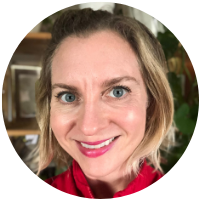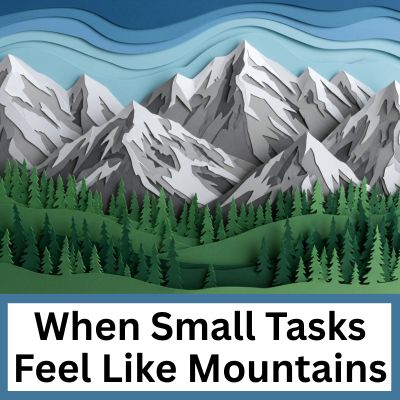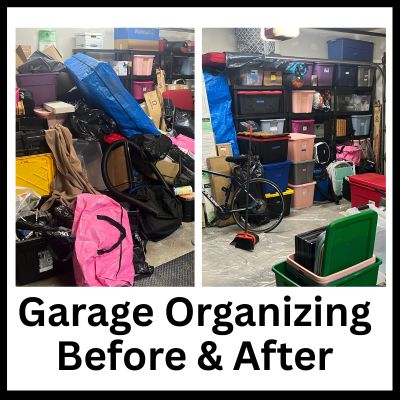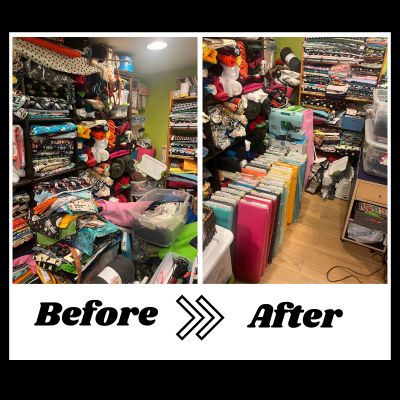What Is ADHD?

Do you have ADHD? Maybe you’ve been diagnosed with ADHD from a clinician, or maybe you’re self-diagnosed. People with ADHD often have trouble keeping their homes organized. In this post, I’ll talk about what ADHD is, and why having it can make it so much harder to keep your home organized. This post is inspired by an interview of Dr. Russell Barkley, PHD (link to podcast below). If you have ADHD and want to get your home organized, this post is for you!
About 75% of ADHD is caused by genetic or mutations to genes. About 25% is caused by acquired injuries such as events that happen during pregnancy or other neurological injuries to executive networks. During pregnancy, if the mother has an infection, premature birth, diabetes, obesity, or maternal consumption of alcohol, those can all contribute to the underdevelopment of the frontal lobe which will result in the baby having ADHD. Interestingly, maternal cigarette smoking does not have an impact on the baby having ADHD, but it is an indicator that the mother likely has ADHD.
Symptoms of ADHD go way beyond the superficial attributes of inattention, distractibility, impulsiveness, and possibly hyperactivity. With ADHD, the seven major executive functions are impacted. The majority of these functions come from the frontal lobe of the brain, but can also come from different parts of the brain as well. They take about 30 years to mature, and are delayed in people with ADHD by about 25-30%. That’s why “adulting” can be so hard for people with ADHD. These executive functions are:
- Inhibition, self-restraint
- Self-awareness, the ability to monitor and attend to your own behavior
- Non-verbal working memory (visual imagery), the ability to imagine things and recall images from your past (hindsight) or anticipating what could happen next (foresight)
- Self-talk, language to yourself. As a child it’s out loud, and as the child grows up, the verbalization is all in their head
- Emotional self-regulation
- Self-motivation
- Planning and problem solving
How does this translate into a disorganized home?
- Without inhibition, self-restraint: You could have issues with over-shopping which makes for too much stuff in the house. You may watch too much TV or playing video games, which will prevent you from being able to make time to clean up. You might get overly ambitious about your projects leaving lots of unfinished work all over the place.
- Without self-awareness, the ability to monitor and attend to your own behavior: You can’t sense when it’s time to start doing something productive or stop doing something that’s contributing to a messy house. You can’t see yourself sitting on the couch watching TV with a big mess around you. You aren’t aware of what’s in your environment. You don’t have the inspiration to do the things that will give you adequate energy for organizing your house such as eating properly, getting exercise, or sleeping enough.
- Without non-verbal working memory (visual imagery), the ability to imagine things and recall images from your past (hindsight) or anticipating what could happen next (foresight): You don’t understand consequences. You don’t see how over-shopping will lead to a house full of too much stuff. You don’t believe that if you don’t go to bed on time, you will feel cranky and lazy the next day. It can also mean that you may be in the middle of a task and completely forget about what you’re doing. You may not remember where you put things, especially if you can’t see them.
- Without self-talk, language to yourself. As a child it’s out loud, and as the child grows up, the verbalization is all in their head: You can’t hold conversations in your mind. You can’t play out scenarios. You can’t remember what you’re doing. You also probably will have negative self-talk going on in your mind, but you don’t have the awareness or skills to shift your thinking to something more positive and productive.
- Without emotional self-regulation: Your moods will be all over the place. You’ll have energetic highs and lows which may be exacerbated by junk food, alcohol, or other substances. You may not be able to organize your house because you get too triggered by the emotional memories held by photographs, paperwork, and other mementos in your home.
- Without self-motivation: You just won’t get your house organized! You also may not have enough meaningful activities in your life to give you a sense of purpose to help give you the structure in your life to help you stay on track with your home organizational needs.
- Without planning and problem solving: You may not understand the order in which items in your home need to be organized or cleaned. You may not see how shelves or drawers can solve organizational problems. You may not be able to come up with solutions to how your house can be organized or solutions to how to stay on track with your goals, such as using a calendar.
What to do about it?
- Get a proper ADHD diagnosis from a qualified clinician.
- Educate yourself about ADHD. Read books, listen to podcasts, watch YouTube videos from a variety of professionals.
- Consider medication and doing food sensitivity testing. Work with an allopathic doctor, psychologist or psychiatrist to find a pharmaceutical that will work for you, or work with a naturopathic doctor or functional medicine doctor for more natural supplementation. I recommend working with BOTH allopathic and naturopathic doctors.
- Work on behavior modification: coaching, traditional therapy, and/or mindfulness training.
- Opt for accommodations to lessen the impact of the disorder. Get help to organize your home, eliminate distractions, use a calendar, check in with a coach. Rearrange your environment so you can do what you want to do!
If you want to learn more about ADHD, I recommend listening to this podcast: Ologies with Alie Ward, Part 1: Attention-Deficit Neuropsychology (ADHD) with Russell Barkley
Or read: Taking Charge of ADHD by Russell Barkley, PHD
Do you have a favorite book or podcast about ADHD? I’d love to hear about it! Please share in the comments.

By Jean Prominski, Certified Professional Organizer
Don’t forget to sign up for my organizing classes here
Download my free 5 week journal The Seattle Sparkle Method to Get Organized and Stay Organized
Sign up for my free 4 Day Color to Declutter Challenge.
Become part of a like-minded community by joining my Facebook Group, Declutter and Organize with Seattle Sparkle.
Ready to book a consultation? Complete this form.
For artwork to energize your home, order through jeanprominski.com or on Etsy.




